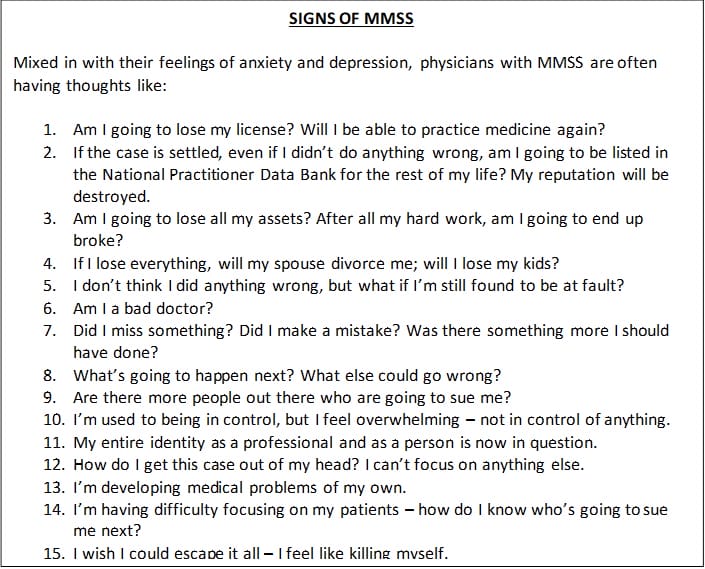By Gail Fiore, MA, MSW, President, The Winning Focus
As medical malpractice lawsuits have become more prevalent, we’ve seen more and more physicians, usually referred by either their lawyers or insurance companies, who are suffering clear symptoms of Medical Malpractice Stress Syndrome (MMSS). They are referred for coaching in connection with an immediate need – the need to become a more effective part of their legal team and a competent witness in their own defense – which needs to be addressed quickly and effectively.
Clearly, however, the stress of litigation – and the accusation of malpractice, whether valid or not – often has a more far-reaching effect on their lives and their practices.
MMSS is likely affecting thousands of doctors. It often goes unrecognized, with the client’s behavior written off as defensive or arrogant. Attorneys, often highly intelligent, hard driving professionals themselves may simply put the physician in the category of a difficult client to work with. Then, insurers become inclined to settle claims faster, to avoid the risk of such a “difficult client” being deposed.
My firm has worked with numerous physicians – highly confident, hard working and successful individuals – who have been sued and are dealing with MMSS. In many cases, it is affecting not only their ability to be strong defendants, but the way they relate to patients, colleagues and their families. And unless it is dealt with, it likely puts them at greater risk of being sued in the future.
We see them questioning whether they’re a good doctor and obsessing over what they could have done differently. They bring the stress home and worry about their spouses leaving them and losing their kids. As they continue to see patients, they think about who might be the next one to sue. They fear their reputations will be irreparably damaged. They sometimes develop medical problems and have suicidal thoughts.
For physicians with MMSS, these are not experienced as detached, hypothetical thoughts, but as actual realities they now must face.
Physicians with MMSS need support and, although these are psychological symptoms, traditional psychotherapy is not an effective way of dealing with them because its focus is too diffuse, and results may take years to achieve. What’s necessary is a practical type of litigation stress coaching – short-term, goal oriented and tailored to the specifics of the pending litigation process.
Physicians need coaching that is clear and straightforward and, since they’re dealing with litigation, it needs to involve their legal team and be covered by privilege. They need to know that MMSS is a common phenomenon and that a productive coaching relationship can be highly effective.
We have seen repeatedly how coaching not only can improve outcomes in legal cases, but can help restore physicians’ confidence and focus, enable them to continue having productive professional and personal lives, and reduce the likelihood of a downhill spiral that results in future claims.
Gail Fiore is President of The Winning Focus, LLC, which works with physicians and other professionals involved in litigation who are having difficulty coping with stress, anxiety and other emotional issues.

The Editorial Team at Healthcare Business Today is made up of skilled healthcare writers and experts, led by our managing editor, Daniel Casciato, who has over 25 years of experience in healthcare writing. Since 1998, we have produced compelling and informative content for numerous publications, establishing ourselves as a trusted resource for health and wellness information. We offer readers access to fresh health, medicine, science, and technology developments and the latest in patient news, emphasizing how these developments affect our lives.








